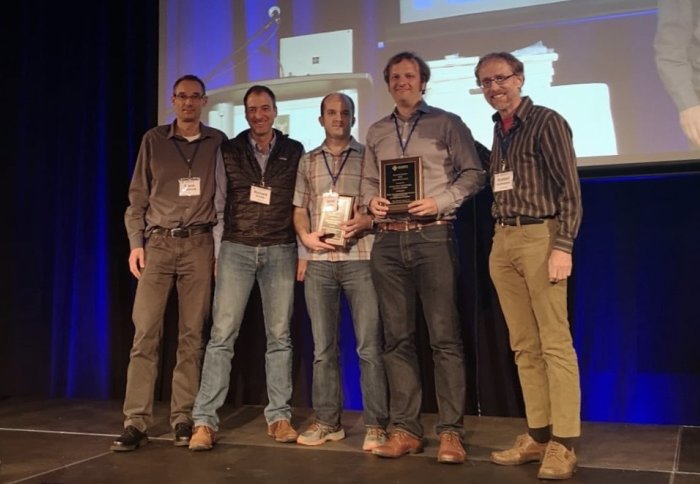Paper co-authored by Professor Cadar elected to ACM SIGOPS Hall of Fame

Award ceremony at the ACM SOSP 2019 in Huntsville, Canada (photo by J. Yang)
Prof Cadar is the co-recipient of the Hall of Fame award for his high-impact systems paper co-authored in 2008
Cristian Cadar, together with his co-authors Daniel Dunbar and Dawson Engler, have received the ACM SIGOPS Hall of Fame Award for their paper KLEE: Unassisted and Automatic Generation of High-Coverage Tests for Complex Systems Programs. The ACM SIGOPS Hall of Fame recognises "the most influential Operating Systems papers that were published at least ten years in the past."
The KLEE paper was published in one of the top computer systems conferences, the USENIX Symposium on Operating Systems Design and Implementation (OSDI) in 2008, while the award was presented at the ACM Symposium on Operating Systems Principles (SOSP) held on 27-30 October 2019 in Huntsville, ON, Canada.
The paper and the associated symbolic execution framework have been influential across several areas of computer science, including software engineering, computer systems, networking, and cybersecurity, among others. The paper has gathered over 2,500 citations according to Google Scholar, and is being studied in courses at many top computer science departments. The system has been used and extended by a large number of groups from both academia and industry, with many others using it as an inspiration for their own systems.
Prof Cadar and his Software Reliability Group (SRG) at Imperial College London are currently the principal developers of the KLEE system, aided by important contributions from outside developers. In the last decade, KLEE has seen important improvements, both algorithmic and engineering in nature. The KLEE community has also released a large number of extensions to KLEE, tackling a variety of important computing problems.
KLEE has a growing community spanning both academia and industry, with over 60 contributors on GitHub and over 350 subscribers on its mailing list. The First International KLEE Workshop on Symbolic Execution took place in 2018 at Imperial College London, attracting over 80 participants from academia, industry and government, with registration having to close early due to reaching capacity.
Article text (excluding photos or graphics) © Imperial College London.
Photos and graphics subject to third party copyright used with permission or © Imperial College London.
Reporter
Press Office
Communications and Public Affairs
- Email: press.office@imperial.ac.uk
